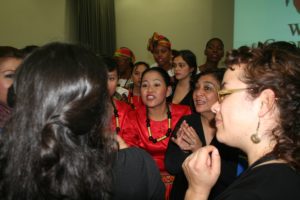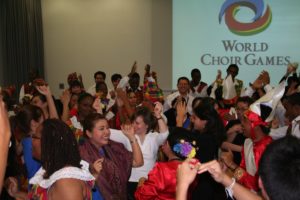The World Choir Games
More than only “games”
Christian Ljunggren
Artistic Director of the World Choir Games
Most of you who read the International Choral Bulletin probably know about this big event that takes place every two years. Maybe you have even taken part in the event either as a conductor, singer, or adjudicator. Personally I visited the first event of its kind in Linz in the year 2000.
From 2002 and the Choir Olympics – as they were called at that time – in Busan (Korea) I have been one of the artistic directors of the event. Thus, I have been very much involved in the preparations of the different events as they continued in Bremen 2004, Xiamen 2006, and Graz 2008. I have so many different experiences, varied memories, and overwhelming feelings associated with the event, so maybe I am not the right person to objectively describe the event. But, since I have been asked by IFCM to do so, I will try!
A meeting place for many different choirs, traditions and choral cultures
Everyone can understand that in The World Choir Games (WCG) the competitions in different categories play an important role. But there are so many more aspects to the event that I would like to underline. For me maybe the most important is that through its sheer size the event functions as a meeting place for singers from all parts of the world. The event has gathered up to 20,000 participants. This means that when you look around, for instance when gathering for the opening event, you can see and say hello to singers from countries you may never be able to visit. Conductors can make friends with colleagues from remote countries. Singers can join together over language barriers. The “Olympic” idea of the event – that not only athletes but also singers could meet in peaceful competition in a world event – was introduced by Günter Titsch and his colleagues in INTERKULTUR, before I was engaged. It was established during the Choir Olympics in Linz 2000. This idea has since been attracting singers from all over the world, also from countries that earlier did not take part in major choral events. The number of nations represented has increased from one event to the other. In Graz we had 93 countries represented.
The variety of choral singing styles is a very important component in the WCG. It makes it more and more difficult to judge in the competitions – and actually puts a special pressure on the choral experts to learn more about traditions with which they are not so familiar. The general tendency is that more and more great singing nations outside Europe are “discovered.” Who among us Europeans knew some years back how strong the choral movement is in countries like the Philippines, Indonesia, Argentina, South Africa – not to speak about China! This gradually has to change the concept of what choral music really is. Another inspiring factor is how clearly big events like this open the borders to other art forms – especially towards theatre, scenic presentation, and dance. We have also had to rethink our concept several times just because new types of choirs and singing traditions appeared. Before the event in Korea, we where not aware of the existence of Buddhist choirs – just to give you one example.
This palette of singing styles is certainly not just exposed in the competitions. They can be seen all over the cities that host the WCG – in the streets, in the various concert halls, in the churches, and also in hotel lobbies, in buses, in restaurants….
A varied and diversified experience for the singers
Big choral events can be focused mostly on getting together to sing. Other festivals and competitions are solely concentrated on the competition element. But as I see it, the WCG offers its participants many varied kinds of experiences. Ok, they have to concentrate during the twenty minutes of competition. Maybe the singers have polished these particular four songs for months! But apart from that they will have many different experiences. They will be able to perform in more leisurely ways taking part in what is called “friendship concerts” when a few choirs come together and sing for audiences in streets and parks. Some choirs are invited to give regular concerts. They can join singing in one or two of the mass events that are arranged. In the so-called Choral Fireworks all singers join in singing with the event orchestra. Then they will of course have the opportunity to hear the other choirs or to get inspired by the music from all over the world. The less advanced choirs – and indeed every choir is welcome – can learn from more advanced choirs. This is of course especially important since a growing part of the participants belong to children and youth choirs. There are also always special concerts arranged that reflect the country in which the event takes place: the performance of Bach’s B-Minor Mass in Bremen, the Chinese Evenings in Xiamen, and the big TV Show in Graz, that was broadcast all over Europe. Another thing that should be mentioned is that in every WCG you will find several first performances. In the contemporary competition category there is even compulsory piece with a first performance.
Another part of the experience is of course the non-musical impressions – enjoying the special culture in the country where the event takes place. Consider the fact that the World Choir Games have been arranged in China and Korea. And will come back to China in the year 2010! For a western singer to come to countries like these gives a new dimension also to the musical sensations, especially for young singers. The same thing must be the case for the many Asian choirs that have come to Europe for our events in Linz, Bremen, and Graz. For instance, 106 Asian choirs came to the WCG in Graz. That is between four and five thousand individuals who may be, for the first and only time, visiting Europe! Musical, cultural, and broadly humane experiences cannot be separated in this case.
Maybe it should be mentioned that sometimes unpredictable things happen that the participants will never forget. Like the Hurricane on the first day of the Xiamen World Choir Games, or when in Busan it was pouring with rain during one of the mass events and our Korean partners quickly produced thousands of raincoats which were distributed among the singers!
The pedagogical aspects of the World Choir Games
It should also not be forgotten that an important part of the WCG are connected to different pedagogical ingredients. Like IFCM’s World Symposia, the WCG gathers many choral experts from all parts of the world. Even if the educational aspect is not the main purpose of the event, it would be a waste to have these professors of choral music, or well- known conductors, sit silently in the jury groups. Thus in every WCG there is a series of workshops and seminars, the structure of which varies each time. In Korea they were made only for the Korean conductors. In Bremen we did them in collaboration with IFCM, in Xiamen there were two parallel series of seminars: one for Chinese and one for international participants. INTERKULTUR has more and more collaborations with choral and conductors’ organizations. For the upcoming 2012 WCG in Cincinnati we are collaborating in partnership with ACDA, the American Choral Directors Association.

In WCG workshops, both conductors and singers are invited. Most successful are the seminars where choirs from different traditions are confronted with each other. Differences in expression and blend can be demonstrated and the seminar participants can thus experience the characteristics of the choral styles. I can mention for instance from last year in Graz, how the lecturer Andre de Quadros confronted choirs from Chile, Jamaica and Indonesia and made them and the seminar participants learn the different ways of singing. The session got wilder and wilder!

The competitions themselves, however, also have a clear pedagogical element. During the WCG there is no time for the “evaluation performances” that the choirs are offered in other INTERKULTUR events – when they sing in front of the jury members without getting scores, only to get advice and tips. But every participating choir is given advice concerning their choice of repertoire. Maybe it is not common knowledge that every piece that is going to be sung by the choirs is sent in for approval and advice. If for instance there are 250 choirs in the event and every choir takes part in 2 categories with 4 pieces each, this means that 2000 pieces of choral music have to be viewed. Then the artistic committee communicates with the choir before the event and gives advice concerning the chosen repertoire. As in all competitions, the jury evaluation not only has the function to determine which choir will win, but just as important for the choirs is the detailed report that tells the choir the opinion of every juror to every piece that the choir has performed. Choirs coming back to several events can compare their standards from event to event. It is a very important fact in the World Choir Games that every choir – every conductor – is recognized and will get a diploma during the final prize-giving ceremony – not only the World Choir Champion!
As a matter of fact I think only a small percentage of the singers come to the WCG to “win”. Most of them come to the events to learn and to grow as musical and human beings. This is why I am happy that the World Choir Games have come to stay. We look forward to the two upcoming World Choir Games in Shaoxing, China, in 2010 and in Cincinnati, USA, in 2012. The World Choir Games event is something to take seriously – it is not only games!
E-mail: christian_ljunggren@spray.se